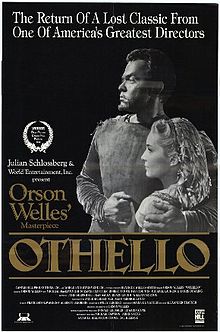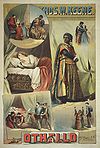- Othello (1952 film)
-
Othello 
1992 re-release film posterDirected by Orson Welles Produced by Orson Welles Written by Orson Welles,
William ShakespeareStarring Orson Welles,
Micheál MacLiammóir,
Suzanne Cloutier,
Robert CooteDistributed by Marceau Films/United Artists Release date(s) 1952 Running time 91 minutes Country United States Language English Othello is a 1952 drama film based on the Shakespearean play, made by Mercury Productions Inc. and Les Films Marceau and distributed by United Artists (1955). It was directed and produced by Orson Welles, who also played the title role (in blackface makeup). The screenplay was adapted by Welles and an uncredited Jean Sacha. The film was shot on location in Morocco, Venice, Tuscany and Rome and at the Scalera Studios in Rome. Welles trimmed the three-hour Shakespeare play to 91 minutes for the film.
In addition to Orson Welles, the cast consisted of Micheál MacLiammóir as Iago, Robert Coote as Roderigo, Suzanne Cloutier as Desdemona, Michael Laurence as Cassio, Fay Compton as Emilia and Doris Dowling as Bianca. Joseph Cotten and Joan Fontaine also appear, uncredited.
One of Welles's more complicated shoots, Othello was filmed on and off over a period of three years. The film was hampered by its Italian backer going bankrupt early in the film. This led to some imaginative solutions; the famous scene in which Roderigo is murdered in a Turkish bath was done because the costumes weren't ready. Shooting began in 1949, but was forced to shut down when money for the production ran out. This led to a stop start production; for example, one of the fight scenes starts in Morocco, but the ending was shot in Rome several months later. Welles used the money from his acting jobs, such as The Third Man (1949), to finance the film.[1]
This lengthy and complicated shoot is detailed in Micheál MacLiammóir's book Put Money in Thy Purse.
Contents
Cast
- Orson Welles - Othello
- Micheál MacLiammóir - Iago
- Robert Coote - Roderigo
- Suzanne Cloutier - Desdemona
- Hilton Edwards - Brabantio
- Nicholas Bruce - Lodovico
- Michael Laurence - Michael Cassio
- Fay Compton - Emilia
- Doris Dowling - Bianca
Reception
Released in Europe to acclaim in 1952, the film won the Palme d'Or at the Cannes Film Festival,[2] though it was largely ignored in the United States. It was controversially restored in 1992 with its soundtrack rebuilt in stereo sound (the dialogue was largely the same, though re-mastered, but the score was newly recorded in stereo) and re-released to theatres. The film was screened out of competition at the 1992 Cannes Film Festival.[3] This version was shown to acclaim in the United States, and first appeared on cable television in 1995.
Restoration and Controversy
In 1992, the film underwent a highly controversial restoration. Beatrice Welles-Smith, daughter of Orson Welles, supervised the restoration, which saw over $1 million spent on improving the picture quality, re-synching the audio, adding extra sound effects not present in the original, and completely re-recording the soundtrack in stereo.
However, film critic and Welles authority Jonathan Rosenbaum has been highly critical of the restoration. He has argued that numerous changes were made to Welles' original intent. He has asserted that the restoration was incompetent, using a copy of the American-release prints which originally came with a technically flawed soundtrack that the restoration has been unable to compensate for, and which could have been easily avoided. He has argued that the now-banned and out-of-print 1995 Laserdisc edition of the unrestored film is far closer to Welles' original vision. Most damningly, he states that in her refusing to give permission for her father's version to be shown or released "she’s effectively made her father’s version of the film (as well as, more indirectly, his final feature, Filming Othello), illegal, so that she can make more money on her own version", since she only receives royalties on the version which she restored.[4] In support of this, he cites several instances of Beatrice Welles suing or attempting to sue restorations and rereleases of her father's work (including films such as Touch of Evil which she does not hold the rights to), unless she is granted a percentage of the profits. Accordingly, he blames her for the unseen status of Welles' final released film, Filming Othello (which contains many clips from Othello), and his last unreleased film, The Other Side of the Wind (arguing that her court success over Othello emboldened her to attempt to claim rights over this film, which is mostly owned by Welles' partner Oja Kodar).[5]
As of 2011[update], the 1992 restoration is now out-of-print in the U.S., and can be found only in outlet stores, whilst the original version remains unavailable.
References
- ^ Filming Othello
- ^ "Festival de Cannes: Othello". festival-cannes.com. http://www.festival-cannes.com/en/archives/ficheFilm/id/4026/year/1952.html. Retrieved 2009-01-18.
- ^ "Festival de Cannes: Othello". festival-cannes.com. http://www.festival-cannes.com/en/archives/ficheFilm/id/27/year/1992.html. Retrieved 2009-08-17.
- ^ http://www.jonathanrosenbaum.com/?p=20202
- ^ “Discovering Orson Welles” by Jonathan Rosenbaum, Google Books
External links
- Othello at the Internet Movie Database
- Othello (1952 film) at AllRovi
Works directed by Orson Welles Filmography · Awards and nominations1940s Citizen Kane (1941) · The Magnificent Ambersons (1942) · The Stranger (1946) · The Lady from Shanghai (1947) · Macbeth (1948)1950s 1960s 1970s Shorts The Hearts of Age (1934) · Too Much Johnson (lost film) (1938) · The Miracle of St. Anne (lost film) (1950) · The Spirit of Charles Lindbergh (1984)Unfinished It's All True (1942) · Don Quixote (1956~69) · Vienna (1968) · The Merchant of Venice (1969) · The Deep (1967~70) · One Man Band, aka London (1968~71) · Moby Dick (1971) · The Other Side of the Wind (1969~76) · Filming 'The Trial' (1981) · The Dreamers (1980~2) · Orson Welles' Magic Show (1976~85)Television Orson Welles' Sketch Book (1955) · Around the World with Orson Welles (1955) · Orson Welles and People (lost) (1956) · The Fountain of Youth (1958) · Portrait of Gina (1958) · In the Land of Don Quixote (1964) · The Orson Welles Show (1979)Theatre Voodoo Macbeth (1936) · Horse Eats Hat (1936) · The Tragical History of Doctor Faustus (1937) · The Cradle Will Rock (musical) (1937~8) · Caesar (1937~8) · Heartbreak House (1938) · The Shoemaker's Holiday (1938) · Too Much Johnson (1938) · Danton's Death (1938) · Five Kings (Part One) (1939) · Native Son (1941) · The Mercury Wonder Show (1943) · Around the World (musical) (1946) · The Blessed and the Damned (1950) · Othello (1951) · The Lady in the Ice (ballet) (1953) · Moby Dick Rehearsed (1955) · King Lear (1956) · Five Kings (1960) · Rhinoceros (1960)Radio The Shadow (1937~8) · Les Misérables (1937) · The Mercury Theatre on the Air (including The War of the Worlds) (1937~8) · The Campbell Playhouse (1938~40) · Orson Welles Show (1941~2) · Hello Americans (1942~3) · Ceiling Unlimited (1942~3) · Orson Welles Almanac (1944) · This Is My Best (1945) · Orson Welles Theatre (1945) · Orson Welles Commentaries (1945) · The Mercury Summer Theatre (1946) · The Adventures of Harry Lime (1951~2)Palme d'Or winning films – 1939–1959 Union Pacific (1939) · Iris and the Lieutenant (1946) · The Lost Weekend (1946) · The Red Meadows (1946) · Brief Encounter (1946) · Maria Candelaria (1946) · Neecha Nagar (1946) · The Turning Point (1946) · La Symphonie Pastorale (1946) · The Last Chance (1946) · Men Without Wings (1946) · Rome, Open City (1946) · The Third Man (1949) · Miss Julie (1951) · Miracle in Milan (1951) · The Tragedy of Othello: The Moor of Venice (1952) · Two Cents Worth of Hope (1952) · The Wages of Fear (1953) · Gate of Hell (1954) · Marty (1955) · The Silent World (1956) · Friendly Persuasion (1957) · The Cranes Are Flying (1958) · Black Orpheus (1959)
William Shakespeare's Othello Characters Source - "Un Capitano Moro" from Gli Hecatommithi (1565) by Giovanni Battista Giraldi
Opera and
ballet adaptationsScreen adaptations Stage adaptations - Catch My Soul (US) (1969)
- Catch My Soul (UK) (1970)
Categories:- American films
- English-language films
- 1952 films
- 1950s drama films
- American drama films
- Black-and-white films
- Films directed by Orson Welles
- Films set in Venice
- Palme d'Or winners
- Films based on Othello
Wikimedia Foundation. 2010.

